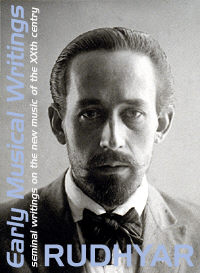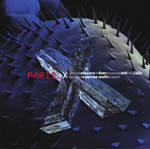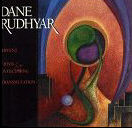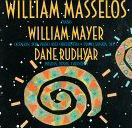 |
| Home | Bio | Art | Music | Literature | Civilization & Culture | Philosophy of Wholeness | Theosophy & Spirituality | Astrology |

A NEW CONCEPTION OF MUSIC
Dane Rudhyar The Musical Forum December 1926 In this idea-packed article Rudhyar touches on many of the key issues and ideals which characterizes his early articles on music, making it an especially suitable introduction to his early writings. In it Rudhyar describes the two directions taken by composers during the 1920s - the reactionary path of neo-Classicism and the path taken by those "endeavoring to bring forth the eternal mother of all harmonies, the all-inclusive World-Music, a new music based on a new philosophy, a new spirituality, a new idealism which is not European but which can be identified with a culture and an order that is gradually coming into being." The Early Musical Writings of Dane Rudhyar are made available for students of musical history and for scholarly research. Rudhyar was concerned that composers, students and scholars should not regard his earliest writings and articles - written while he was still a young man - as his most significant literary contributions to music. The reader is referred to Rudhyar's book The Magic of Tone and the articles The Transforming Power of Tone and When Does Sound Become Music for his mature and fully developed contributions. |
|
Related Articles |
|
Archived Music Articles |
|
|
Also Available Online |
|
» Rudhyar's Integration of Experience and Concepts - Music, from Leyla Raël's The Essential Rudhyar. |
|
Available Offsite |
|
Musical Works |
|
Musical Scores |
|
For scores of Rudhyar's musical works, visit the site of the American Composers Alliance. Musical scores 5 Stanzas and Granites are also available from SheetMusicPlus.com |
|
Also of Interest |

The Music of Rudhyar & Satie PARIS-X Musica Obscura Richard Cameron-Wolfe, Piano. Hear a sound clip 
Piano and String Compositions AVENT, CRISIS & OVERCOMING, TRANSMUTATIONS Marcia Mikulak, Piano and The Kronos Quartet 
An Earlier Recording of Rudhyar's Music Now on CD MASSELOS PLAYS RUDHYAR |
|
Home » Music » Articles on Music  Music, like all the arts, develops in cycles which correspond in the main to historical periods when some particular ideal or great human principle is dominant. Our Western music which reached such characteristic development throughout the nineteenth century has, during the last thirty years, been passing through a crisis which every thoughtful student of music must recognize as a vital turning point. As to the ultimate meaning of this crisis, opinions diverge sharply, and the purpose of this article is to outline, first, the two interpretations which are the logical conclusion of two opposite musical premises, and, second, to put forward the writer's own conception of the sort of music which is destined to play a part in the next great social gesture of the race. Of civilizations there have been many and there will be many more; for each of them there has been, and will be, a specific "musicality". No one of these can be said to be inherently superior to any other. All are different; all fulfill their mission, racially, culturally, and individually. Who shall say that Greek civilization was greater than Mayan civilization, or that Chinese music is inferior to European music? Each race has its own particular sense of music; each race hears music differently; the music of each race acquires the peculiar qualities which that particular race requires, emotionally or spiritually, of the art. The qualities that characterize European music have some vital relationship with the forces which have moulded our social life in the last few centuries, and if it is true, as most of the prophets tell us, that we are nearing the end of one sort of civilization and groping our way towards a new brand, may it not be possible that the European musicality with which we are so familiar may have outlived its human usefulness, and that a new musicality may be in the throes of birth on the new continent of America, which is to be the seat of the new western civilization? As Greek music was different from Hindu music, as classical European music was different from Greek music, so must the future music of America be different from the music of Europe. Different not only in its outward form, but different in spirit. If we are to have a really new civilization rather than a patched form of the old, then we must acquire a new sense of music, a new faculty of hearing. And there are signs that this is actually happening. The two fundamental present-day attitudes toward music to which we have referred are: First, the attitude of those musicians for whom European music is the paragon of musical excellence (at least for the Western races) and for whom recent developments in so far as they are a prolongation or sublimation of romanticism and impressionism are perversions of the classical purity, which has been lost for over a century — an attitude maintained by the majority of European composers who yesterday were the most fervent musical revolutionaries. And, second, the attitude of those who — consciously or semi-consciously — are endeavoring to bring forth from the eternal mother of harmonies, the all-inclusive World-Music, a new music based on a new philosophy, a new spirituality, a new idealism which is not European but which can be identified with a culture or an order that is gradually coming into being. A backward glance over the musicalities of the past will make it easier to understand the present trend. Of Greek music we know very little. If it represented the first stage of European music, the Middle Ages, with their plain-chant and early polyphony represented its adolescence, and maturity came with the classical period following the Renaissance. During this span, from 1300 to nearly 1800, the curve of development was very significant, but as yet it is not widely understood. The "new music" of the fourteenth century was a protest against the pseudo-Pythagorean theories perverted in the name of scholasticism. It was strictly polyphonic and built on the interval of the third, which until then had been discountenanced. It came originally from Ireland and England, undergoing modifications in Paris and Flanders. It was Nordic music. From Northern France it gradually went South toward the Papal Court in Rome. In two centuries it grew to its perfect achievement, the motet (mass), culminating in the works of the French Orlando di Lasso, the Spaniard Vittoria, and the Italian Palestrina (sixteenth century). Following the great current of individualism which raged through the late Renaissance, the motet saw its situation challenged by the musical drama — soon destined to degenerate into the opera — and by chamber music, an outgrowth of popular and dance music. Meanwhile Protestantism aroused cultural energies in the Germanic lands. Music moved northward. Southern melodism and Flemish counterpoint combined to give birth to the Germanic motet and oratorio which Bach was soon to bring to perfection, while Mozart and Haydn were enlarging the Italian chamber music partita and suite into the symphony. What was the essential characteristic of such a classical music? This, that it rested on the abstract concept of interval. Asiatic music had been, and still remains, a music in which the main emphasis rests on the single tone — tone which is meant to symbolize an incarnating cosmic entity, a god, and is closely related to cosmic influences, seasons, planets, human functions. European music, on the other hand, lost interest in the single tone, or even in the harmonic series of such tones (modes), and became preoccupied with the construction of patterns of musical intervals. The tone became the "musical note", that is, the edge of abstract intervals, of no absolute pitch, transposable at will. Characteristic patterns of notes, that is, series of definite mathematical proportions, became the foundation of music under the name of "tonalities". Such tonalities were used much as Persian rug weavers use conventionalized motives. Music was turned into a species of decorative art. Form was all-important: it was "constructed"; it was balanced; it extended in space, like a French garden; its many parts were conceived as arabesques. Line counted above all else. A fugue is a combination of lines according to artificial rules, or at least rules purely abstract in meaning. Classical music became thus divorced both from the cosmic life of natural elements and from the purely human life of soul-expression. It became strictly objective. It satisfied an age of rationalism. For the Aryan races of old [Aryan being the culture of ancient Iran and Northern India], music was essentially subjective. It was the expression of the human ego evolving throughout the ritual of seasons and the surrounding natural conditions. Or, in its most archaic condition, it was the manifestation of occult powers, a channel for the tremendous divine energies which were used for magical ends. It was conceived as such even by early Christians, and Syrian plain-chant was based on pure cosmogonic, alchemic considerations, as can be seen from the works of Bar-Haebraeus on music. But the early Christian plain-chant when coming to Rome lost its cosmogonic conceptions. It became intellectualized further when the need for part-singing, or polyphony, arose, and when it became necessary to have a strict notation. From that departure can be traded the progress into absolute objectivity and intellectualism, until music had become a definite expression of a feudal, separative, analytic civilization. Then emerged the impulses which culminated in the French Revolution, questioning everything, letting loose a flood of new ideals which shook life to its very foundations. Culturally the phenomenon manifested itself in romanticism. In music it made itself mightily heard in the works of Beethoven, the indomitable individualist, contemptuous of kings. Berlioz, Chopin, Liszt expressed the romantic ferment in a renewed music. Wagner, with his synthetic genius, brought the movement to its apotheosis. Romanticism then turned into a sort of expressionism — an advanced stage of the same process. Schoenberg pushed to the extreme the typical romantic musicality of Wagner and Liszt. And then came the great war and social chaos. Our interpretation of the present day must needs rest upon our understanding of the events that signalize the history of the western hemisphere since the beginning of the eighteenth century. Unless we consider that the eighteenth, nineteenth, and twentieth centuries were three acts in a great human drama, it seems to me that we cannot grasp the meaning of any phenomenon, cultural or social, which occurred during that period. In the eighteenth century, with its encyclopedic thirst for knowledge, its desire for political freedom and for the rule of universal reason, we see the European mind shaking off the shackles of the feudal past. In the nineteenth century, with its emotionalism, its religious and humanitarian aspirations, its craving for universal love, we see the European soul trying to free itself from creeds and conventions. From the point of view of European civilization as a whole, those two centuries were failures. The effort for liberation failed because the feudal attitude to life was too deeply set to be uprooted. The old Western civilization in Europe failed to be reborn of the spirit, in spite of outer changes; but the new Western civilization in America was reborn. Franklin and Jefferson were free minds; Lincoln and Walt Whitman free souls. In other words, the eighteenth and nineteenth centuries were the beginning of the end of European civilization; whereas they marked the real beginning of American civilization. The twentieth century is the result of the two preceding ones. It opened with the Russo-Japanese War, the Balkan Wars, and the great War of 1914 which sounded the death-knell of Europeanism wherever located. What is the musical counterpart of this transition? The old European music, just before the war, was mortally assailed by two works: Schöenberg's Pierrot Lunaire and Stravinsky's Sacre du Printemps. The former dissolved it; the latter crushed and hammered it. After this there remained nothing for the Europeans to do but turn back to the past, as children in distress to the mother, or as domesticated birds set free and starving to their cage. And this is exactly what the Europeans are doing. Just as nationalism and Fascism sprang up on the failure of the old politics to face new conditions with a new outlook, so European musicians are hypnotizing themselves into the belief that tonality means salvation and that a return to the seventeenth century, to the old forms and old patterns, will recreate the musical Paradise, so violently ravaged by the "disease of romanticism", as they call it. This they have done after trying Schöenberg's atonalism and Stravinsky's polytonalism and finding that both lead into blind alleys. Here, for the sake of the layman, it may be explained that "atonalism" means the use of the twelve notes of the chromatic scales irrespective of any sense of tonality, each note being an unrelated entity free to combine with or follow any other note or group of notes. "Polytonalism" means the simultaneous use of melodic and harmonic lines or groups of different tonalities, the sense of tonality thus being destroyed by the crushing of one tonality against another. Schoenberg's school is working on the basis of a neo-scholasticism, while Stravinsky and his French and Italian followers worship at the altar of musical objectivity, hoping to rival the old masters. Reaction becomes their password, nationalism their by-creed. Another trail, however, had been blazed before the outbreak of the war. At least two other composers had a different goal in sight. Though European civilization be dying, yet from the old, decaying plant comes the seed from which the new growth must emerge, since nothing in life begins from nothing. English and French philosophers and men of action carried to the young American colonies the seed-ideas of democracy, spiritual equality, and religious freedom. Likewise, a few European composers, Debussy and Scriabin in particular, succeeded in a measure in overcoming the confining bonds of European musicality, and others now, born in Europe but having found themselves and their true field of expression in the new world, are planting the seeds of a future musicality in the soil of this continent. Debussy was the first European musician to try to overcome local limitations, musical feudalism, by direct contact with Asiatic music. The audition of the Javanese orchestra at the Paris Exposition in 1889 and his trip to Russia were the two great events which determined his own musical rebirth. From the former he learned the vital power of a "mode", and from the latter he received the gospel of freedom of self-expression. Debussy remains essentially European, yet in his feminine nature he represents almost the maternal source of the new music. He may not have been the seed of the future, but he certainly was the fruit holding the seed within its precious flesh. Scriabin, on the other hand, is the one great pioneer of the new music of a reborn Western civilization, the father of the future musician. And it is significant that it was while traveling through America, at the turning point of his own career, that he felt the new urge which led him into entirely new musical realizations during the last few years of his life. It is doubtful whether many people really understand Scriabin's later music, even though thousands admire him. For with these works it is not so much a new form of music which one finds as it is an embodiment of a new sense of music. Any one who listens to Scriabin's later works with the same ear that he brings to the performance of a Mozart symphony simply cannot hear the message. For Scriabin speaks not only a new tone-language, but a new language of the soul. A new tone-language first. While we cannot here explain the basis of this new language, it may at least be said that, while the classical language of music was founded upon the octave and its division into major and minor scales, Scriabin, in his later works, which reveal his true self, evolves his musical substance out of the tones produced by a series of fourths. Such tones melodically considered form modal series which constitute the warp and woof of his compositions. While this may not mean much to the lay reader, it should at least convey the idea of a fundamental change, a sort of chemical change transforming the very cells of music. This, however, is only the outer manifestation of an inner musical rebirth. With Scriabin the deep philosophy of Eastern mysticism enters the realm of Western music. Romantic emotionalism he transmutes into spiritual and metaphysical aspiration. The egocentric attitude of the last century, at times offensive, becomes with him the divine urge for self-realization. Music is reborn as a manifestation of the true and universal religion of life. And it must be approached as such if it is to be at all comprehended. It must be realized as a subjective experience, a tone experience; whereas classical music before Beethoven was essentially to be contemplated as an objective pattern, even though at times a pattern of cosmic proportions. It is some such higher subjectivism which must be the keynote of Western music as it becomes incarnated into the new human soil of America — a quality that has something in common with the lyricism that makes the poems of Walt Whitman alive and exalting. Meanwhile, though the authentic tendency is becoming clearer, there is the inevitable confusion of a transition period. New York, the great clearing house of world art, is welcoming all, good, bad, and indifferent. Fortunately the musical emulsion is settling down a little; the oil and vinegar of new and old are separating. The Latin reactionaries and their apostle, Stravinsky, are falling back to tonalities, to seventeenth century ideals, to music — which is decorative art. Lovely and prodigiously talented as their works may be, they belong to an outworn creed, dissonances and instrumental novelties notwithstanding. Schöenberg's group are also identified with the past in their rule-ordained music. What remains? The spirit of all those who, conscious that here, on American soil, a "new world" is being generated, are willing to toil and suffer and learn and search, impersonally, religiously, stubbornly, so that the new musical order may become a fact, so that a new sense of music may transfigure both creators and recipients. Names do not matter. But the dawn of a new musical era may be descried in the open-air orchestras of California where a new public is being constituted whose approach to music is direct, unanalytical, pure. The dawn is manifest in the persons of a few young American composers under thirty and of one or two elders who are striving, from coast to coast, to articulate new sounds which shall correspond to the new spirituality of the era in which we live. This is the music of the beginning — humble and obscure as all beginnings must be. Contrary to popular assumption, the new music does not come in the form of something startling and tremendous. European composers may go on producing startling masses of sound, hair-raising dissonances, which upon examination prove to be meaningless and poor. The new music will bring, not so much an unusual form as new tone experiences which, to be heard, will have to be listened to with new ears. On the technical side this involves mainly a revaluation of sound. We have lost our sense of the importance and meaning of sound. Sound is the one common substance and foundation of all musicalities. It has laws of its own, a cosmic nature, a spiritual potency which all true musicians ought to know. Acoustics, as it is understood today, is but a fragment of an ancient and more complete knowledge. But even acoustics is a closed book to many composers. On the rock of the knowledge of sound and tone, and not of rules dealing with the form of compositions, will the new music be established. The deeper the knowledge, the more authentic the musical inspiration, and only upon the most secure foundations can we hope to build a tower that will pierce through skies that no longer reveal the old customary gods.  Home | About | Calendar | Ephemeris Charts | Art Gallery | Library | Resources Shop | Links | Rudhyar Archival Project | Help Web design and all data, text and graphics appearing on this site are protected by US and International Copyright and are not to be reproduced, distributed, circulated, offered for sale, or given away, in any form, by any means, electronic or conventional. See Notices for full copyright statement and conditions of use. Web design copyright © 2000-2004 by Michael R. Meyer. All Rights Reserved. |